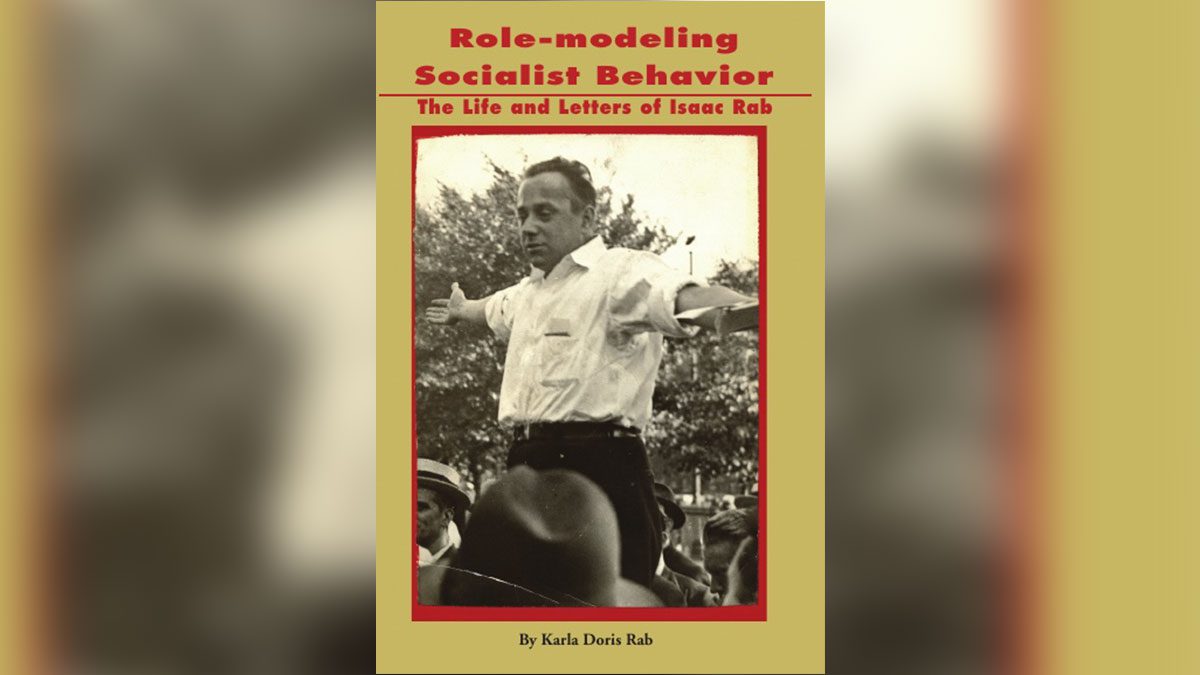Book Review from issue 22 of The World Socialist Review
Role Modeling Socialist Behavior: The Life and Letters of Isaac Rab, by Karla Doris Rab. 504 pages. Lulu Press. $23.16.
For most of the twentieth century, Isaac Rab (1893 – 1986) was well known in the Boston area as a socialist soap-box orator, lecturer, and teacher. He was a founding member of the World Socialist Party of the United States and a central figure in the Boston Local for many years.
In this book, our comrade Karla Rab, who is the granddaughter of Isaac Rab, tells the story of his life and presents a large selection of his surviving correspondence as well as many photographs. She draws on her own reminiscences and on those of many others who knew her grandfather.
Isaac Rab was born into an immigrant socialist family on December 22, 1893. He devoted his whole life to the cause until his death on New Year’s Eve 1986. In 1916 he helped form the WSP from the left wing of the Michigan Socialist Party in Detroit. Later he settled in Boston, where he organized the Boston Local of the WSPUS in 1932. He also taught classes on Marxian economics for other organizations, including the Communist Party, the Proletarian Party, and various Trotskyist groupings.
Karla Rab’s book is, of course, about much more than her grandfather as an individual. It is the first history of the World Socialist Movement in the United States. Its importance is great but subtle. It is often said that history is written by the winners. Even the obscure history of North American left politics has its hierarchy. Credibility is given only to “winners” such as the Industrial Workers of the World, the Communist Party, and the Congress of Industrial Organizations – even though many of the problems that plague the workers’ movement are the logical outcomes of their policies.
Social democrats and Leninists like to portray smaller groups like the WSPUS as “isolated sects.” And as the history of the working class movement has been written mainly by them, who is to challenge what they say? However, with the collapse of the left in the United States there has been a reassessment of what various political organizations actually accomplished. For example, in their study of the Auto Workers Union [1] the 1930s era Trotskyists Genora and Sol Dollinger conclude that the Communist “leaders” of the Flint sit-down strikes only succeeded thanks to assistance from the Proletarian Party, which has usually been derided as an isolated sect.
The book under review proves that the WSPUS, while small, was hardly isolated. Rab’s letters demonstrate involvement in the United Auto Workers and the Typographers’ Union (a model of democratic unionism) as well as discussions and debates among a wide range of left groups. Among the members of the WSPUS there were highly experienced class warriors. William Pritchard and Jack McDonald had helped lead the Western Labour Rebellion in Canada. Sam Orner had been an IWW organizer in the hard metal mines of the American Rockies as well as the leader of a famous strike of New York City taxi cab drivers in 1934. (He was the model for the character Lefty in Clifford Odet’s famous play, Waiting for Lefty.) The Detroit Local of the WSPUS had members who had helped form the United Auto Workers and played roles in the educational services of the most militant UAW locals (Irving Canter, Joe Brown, David Davenport, Frank Marquart). [2]
Another important thing about Karla Rab’s book is that it shows how Rab organized his political activity. His letters are a lesson of lasting value in how to approach the personal as well as the intellectual and educational aspects of building a movement for socialism. I have forty years of experience in organizing community groups and labor unions as well as political groups. I have found this book a first-class resource and have dipped into it repeatedly since first reading it in draft form.
FN Brill
Notes
[1] Soll Dollinger and Genora Johnson Dollinger, Not Automatic: Women and the Left in the Forging of the Auto Workers Union (New York: Monthly Review Press, 2000).
[2] See: Frank Marquart, An Auto Worker’s Journal: The UAW from Crusade to One-Party Union (Pennsylvania State University Press, 1976).



